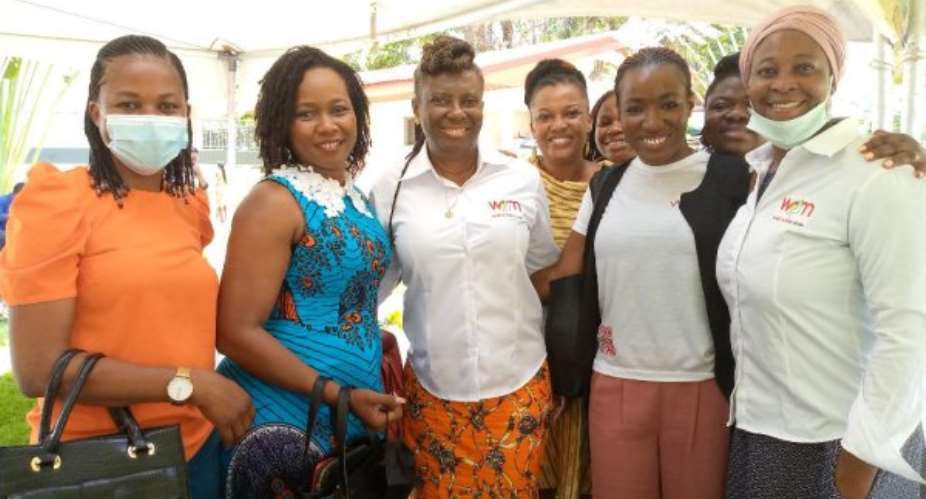The Australian High Commission in Ghana on the occasion of International Women's Day (IWD), held a mentorship breakfast meeting with women working in the mining sector.
The meeting enabled them to share experiences and inspire the younger generation of women in the mining sector.
The advocacy group, known as the Women in Mining (WIM) Ghana, comprises of members with diverse skills, knowledge and technical expertise in areas including geology and hydrology, which are critical in ensuring sustainable mining.
Ms. Leann Johnston, the Charge d'Affaires at the Australian High Commission, in her welcoming remarks, commended the participants, and also all women for their great and diverse contributions towards global and national development.
She also commended the Government of Ghana adopting and implementating various gender sensitive policies and programmes which promoted women empowerment and gender equality, but said there were still huge inequalities in areas such as female representation at decision making levels.
She said the Commission's focus on Women in Mining (WIM) this year, stemmed from the fact that despite their vast contributions to the growth of the sector, female efforts and achievements in the sector had received the least recognition and celebrated.
The meeting which was on the theme: “Equality today for more sustainable operations tomorrow,” couched out of the broader global subject for the annual event, which was to celebrate the achievements of all females, and increase their visibility.
Speakers at the panel discussion, who were made up of both female and male achievers from the mining sector, and some corporate institutions, shared their knowledge and experiences with the audience based on the topic: “Breaking the Biases by prioritizing women's representation and contribution in Ghana's mining and natural resource sector; the role of government and stakeholders.
Among them were Ms Adiki Ayitevie, the Regional Vice President, Sustainable and External Relations, Newmont; Ms Bashiratu Kamel-Muslim, a Labour Consultant and member of WIM; Mr Dave Harper, the Chief Executive Officer, Geodrill; Ms Amanda Odoi, a Gender Specialist and Australian Alumni Ambassador, and Dr Yvonne Loh, a Senior Lecturer at the University of Ghana, Legon.
Ms Georgette Barnes, the President of Women in Mining, said the Group was keen on championing the cause of gender equality in mining because their numbers were still very low, due to the numerous barriers that female practitioners had to cross to enter into the male dominated sector.
She said although the number of women working in the mining sector had increased compared to what pertained in the early years of 2000, there was the need to create a friendly working environment to attract more females, and also get them to occupy top leadership positions to change the narrative.
She also stressed on the importance of networking of female practitioners because the field could be a very lonely one especially, for those who found themselves alone among all male working colleagues, adding that “when you are in a community where you have people to relate to, it makes you feel much better”.
Dr Loh, spoke about the numerous socio-cultural barriers to be broken by women to get their spaces opened, informed that in most cases there were some unfavourable prices to be paid for their choices.
She said there seem to an air of fear and threat among a section of men towards female advancement and empowerment, but allayed their fears, saying, “we are not competing against men, but rather training ourselves to grow in wisdom and not to challenge men.
Some men still want to be domineering and want to have the power over women to remain domicile so they are controlled,” saying “we want to find our space and help so that together can met whatever their grand agenda there is to achieve”.
Dr Loh cited an example of the reasons why most families fall apart when men, who were the breadwinners die, as the lack of the empowerment of their women to take over the home and manage it well in the event of the unfortunate.
She called for intensified advocacy for additional efforts to close the gender inequality gap particularly in the mining sector, though increased budgetary support from government, to enhance infrastructure and training to empower and attract more women.
She further called for closer collaboration across the gender divide, to achieve the Sustainable Development Goal 5, on gender equality.
GNA





 Election 2024: Retrieve all guns from civilians – GUM to govt
Election 2024: Retrieve all guns from civilians – GUM to govt
 Collapse of Zamboree school building: 20 pupils narrowly escape death at Assin N...
Collapse of Zamboree school building: 20 pupils narrowly escape death at Assin N...
 “Don’t take the country’s peace for granted” – Asantehene caution Ghanaians
“Don’t take the country’s peace for granted” – Asantehene caution Ghanaians
 Cedi can only stabilise temporarily — Prof Bokpin
Cedi can only stabilise temporarily — Prof Bokpin
 Calling for emergency sitting needless — Minority to Speaker Bagbin
Calling for emergency sitting needless — Minority to Speaker Bagbin
 We've made massive investments in technology-driven education – Akufo-Addo
We've made massive investments in technology-driven education – Akufo-Addo
 Lack of requisite investments in African FinTechs hindering the goal of a digiti...
Lack of requisite investments in African FinTechs hindering the goal of a digiti...
 For Africa to develop, we must all coalesce around an "African agenda" — Dr Amin...
For Africa to develop, we must all coalesce around an "African agenda" — Dr Amin...
 NPP will win 2024 election with a strategy NDC won’t understand – Sammi Awuku
NPP will win 2024 election with a strategy NDC won’t understand – Sammi Awuku
 Dialysis patients in Ghana lament as treatment costs soar from GHS380 to GHS 491
Dialysis patients in Ghana lament as treatment costs soar from GHS380 to GHS 491
